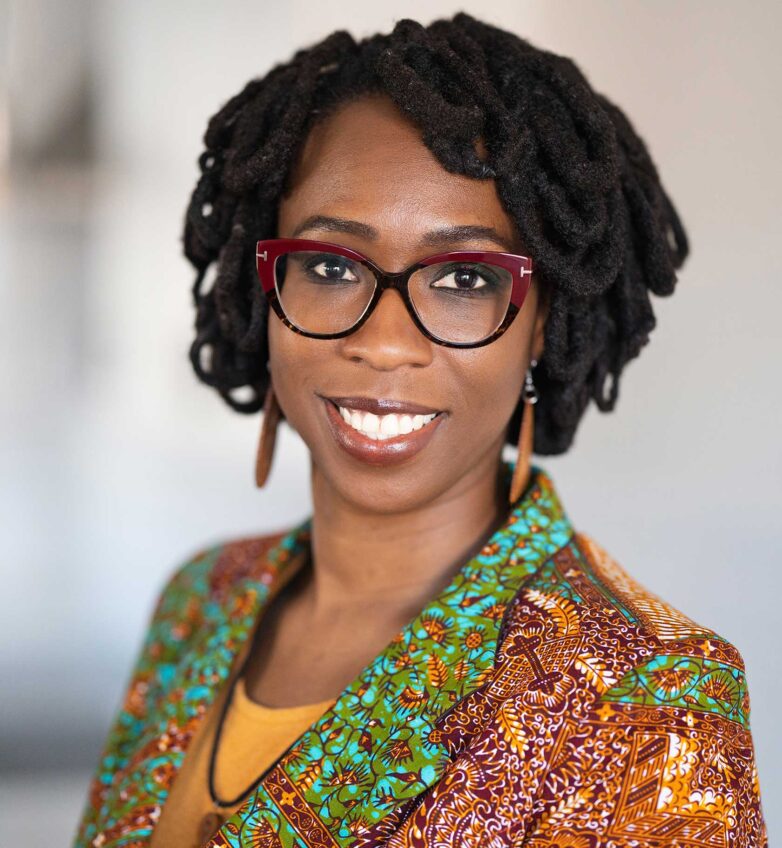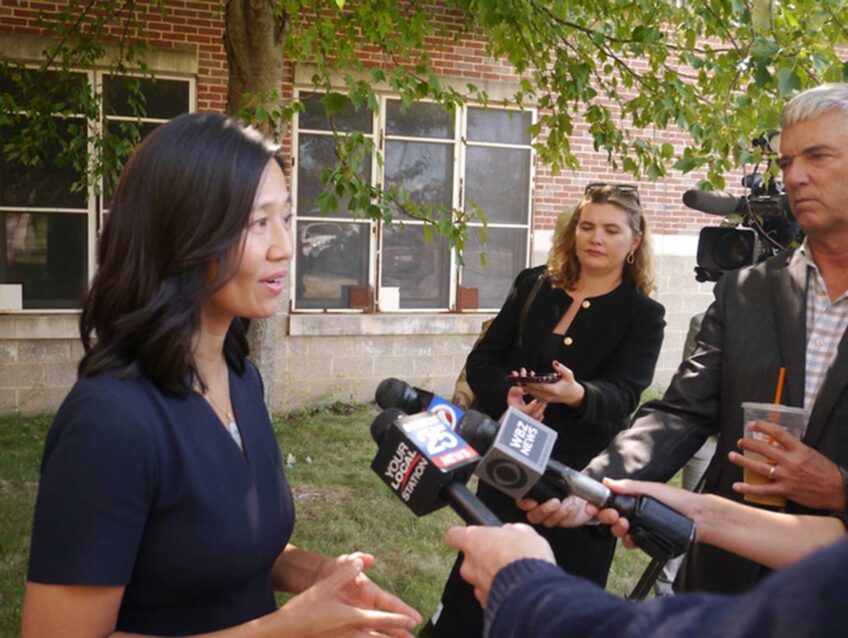Green retrofit projects face hurdles under federal funding cuts
Local support still in play on projects that can support community health, emissions reductions

When Codman Square Neighborhood Development Corporation was awarded a federal grant last fall, it was set to mean health improvements, cost savings, and greenhouse gas reductions for residents in its Talbot Bernard Senior property.
The $750,000 grant meant that, at the 31-unit affordable development for elderly residents on Talbot Avenue in Dorchester, Codman Square NDC would be able to upgrade ventilation and improve weatherization to increase energy efficiency.
They were steps that would improve air quality for residents in a community of seniors facing asthma rates higher than the rest of the city, as well as cost savings for Codman Square NDC that could be put toward other initiatives.
So, when the United States Department of Housing and Urban Development, the federal agency that awarded the grant, refused to finalize the grant or distribute the funds, it left the neighborhood development corporation scrambling to plan how to tackle the project at a reduced scale.
The funds to Codman Square NDC were eventually restored — a spokesperson said that the group has yet to receive the funds, but HUD is moving forward with processing the paperwork for the award, but only after the organization joined a lawsuit in the United States District Court of Rhode Island alongside five other plaintiffs.
A judge in that court granted a preliminary injunction against the freeze April 15.
But Codman Square NDC isn’t alone in its hurdles. The Green and Resilient Retrofit Program, under which it received the grant, was reportedly terminated by HUD in March.
“The president says he wants to address the housing crisis, and this program was doing just that,” said Zoe Middleton, associate policy director of Just Climate Resilience at the Union of Concerned Scientists. “It was maintaining affordable housing and bringing people’s bills down at the end of the day, so this move is pretty nonsensical.”
The award of the grant funding received by Codman Square NDC was announced by HUD in November. It marked the last of 12 rounds of funding executed by the federal agency under the Green and Resilient Retrofit Program, with HUD delivering over $1.43 billion across the country from the Inflation Reduction Act in that tranche.
That round of funding included 45 projects in 23 states — including red-leaning states like Alabama, Florida and Tennessee. Part of the funding deal was an agreement that the award of the funds would also mean that the projects preserve affordable housing at the site to avoid displacement, something Middleton said is often a concern with retrofit projects.
At the time of the awards, Adrianne Todman, the then-head of HUD, touted the benefits it’d bring to residents across the United States.
“These investments from the Inflation Reduction Act are going to help preserve and modernize affordable homes for countless people over many years to come,” she said in a November statement.
Those benefits would have been borne out by an array of projects. The kinds of efforts covered by the umbrella term “green retrofits” are widely varied.
“It’s not a one-size-fits-all. There are a lot of different kinds of retrofit projects out there,” said Jonathan Levy, chair of the department of environmental health at Boston University’s School of Public Health and a core faculty member with the BU Institute for Global Sustainability.
Middleton pointed to projects like adding heat pumps, prepping roofs for the addition of solar panels, and improving a building’s ability to retain heat or cooling and improve energy efficiency, but the term is more of a broad catch-all for projects that take older housing stock and make it more energy efficient or reduce emissions.
“It really is use-specific, depending on even the property and the geography the property is in — what kind of hazards and whatnot the property encounters,” Middleton said. “The flexibility of a retrofit program is essential.”
But across the board, they tend to be a step toward improving the quality of life for residents.
“A lot of these projects have at least one goal to reduce greenhouse gas emissions, which has long-term benefits for climate change, but they also have several benefits for the health of the local community,” Levy said.
Efforts to support electric vehicle infrastructure can reduce air pollution from tailpipe emissions. Projects that reduce the amount of fossil fuel emissions burnt by homes can impact local and regional air quality.
“Many of these projects are, at their core, about improving the health of local residents,” Levy said.
It is one of the priorities on the minds of officials in the city of Boston as well. Brian Swett, the city’s chief climate officer, said that the benefits of retrofits are manifold; a project that replaces gas stoves with induction ones to reduce emissions is also about addressing childhood and senior citizen asthma rates.
“It doesn’t need to be about reducing emissions — that’s the right thing to do from a public health standpoint,” Swett said. “I think, for us, emissions [reduction] is a co-benefit and an equal benefit as public health benefits and energy cost reduction.”
And retrofitted buildings can support residents’ needs in existing structures, rather than building new ones, a process that can be hampered by long development processes.
“People talk a lot about the need to build more new affordable housing — and we certainly do — but in 10 years’ time, most people are going to be living in a unit that is similar to the ones they’re living in now, that already exist,” Middleton said. “The need to do retrofits and to work with the housing stock we currently have, in addition to putting new meaningfully affordable stock on the ground, is critical.”
Despite reduced federal support, work to retrofit buildings to increase their energy efficiency — and the funding to do that — is still coming, just from other directions.
Following the reelection of President Donald Trump, local climate and environment advocates and officials pointed to a need for increased city and state leadership on green efforts. In Boston, the city is following through.
At a press event on May 7, officials from the Environment, Energy, and Open Space Cabinet gathered in Fenway to announce the inaugural awardees of the Equitable Emissions Investment Fund.
Through those awards, three community development corporations were given a total of $750,250 in city funding for a varied range of approaches to retrofit housing projects across Boston.
Among the awardees was Codman Square Neighborhood Development Corporation, which received $255,000 for another retrofit project, this one targeting decarbonization efforts at its Washington Columbia apartments.
Swett said that even with the federal landscape “changing daily” with fits and starts, as programs get targeted for review by the Trump administration, the city intends to “continue to do the work.”
“We continue to move forward, right? This is not pausing our action, either in mitigation or on an adaptation,” he said. “We have a diversified approach to our funding streams and financing, and we’re adapting as we go on to make sure that we’re getting critical projects done in the time that they’re needed.”
The Equitable Emissions Investment Fund is part of the city’s efforts around its Building Emissions Reduction and Disclosure Ordinance, or BERDO, which, in 2021, established requirements around the reporting of energy and water consumption for commercial buildings 20,000 square feet and larger or residential buildings with 15 or more units.
The ordinance also creates emissions limits, tapering off the emissions from the buildings to reach net-zero emissions by 2050.
This inaugural round of grants under the fund were provided through the city’s operating budget, but future rounds will be funded through alternative compliance payments, paid by the owners of buildings subject to BERDO in addition to or instead of energy efficiency improvements of their systems.
That next round of city funding is set to be announced in August. Applications to the fund are open through May 30.
However, the city’s funding for retrofit projects won’t necessarily be able to close the gaps. Middleton said it will be a challenge for state and local governments to make up the financial and administrative power that the federal government wields — consider, the sum of awards under the city’s fund is about equal to what the grant allocated to Codman Square NDC through the HUD program.
But she spoke positively of the steps being taken by the city.
“Addressing the crisis has to be a whole-of-government approach,” she said, “but I think Boston’s making a valiant effort.”
To Levy, the city’s continued support shows that the city understands the connection between emissions reductions and health and well-being.
“If these were measures that were just intended for long-term global benefit, the city would not be investing its limited dollars in doing them,” he said. “They understand that this really is about making people healthier in the near term.”




